M&A green shoots & scandal central

Welcome to Ignition Lane’s Wrap, where they cut through the noise to bring you their favourite insights from the technology and startup world.
Big deals, big dollars
Green shoots in the M&A market
Huge. Atlassian will acquire video messaging platform Loom for nearly US$1bn ($US880m cash plus some equity earn out) – a price that’s 36% below Loom’s 2021 valuation of $1.5bn. Its biggest acquisition yet, Atlassian is betting big on remote work and distributed teams. Loom allows users to overlay video with screen recordings – a very handy tool for anyone working asynchronously. Atlassian’s existing collaboration and IT service management apps, including Jira, Confluence and Trello, have more than 260,000 customers globally.
Related data point: Salesforce CEO Marc Benioff on the 20 Minute VC podcast – Salesforce has two different policies on WFH for engineering (just 10 days per quarter) vs. sales and marketing (3 days per week) – “being in person with customers is critical.”
Goals. DevOps automation platform, Octopus Deploy surpassed US$50M in ARR. From the CEO:
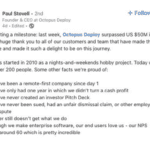
Can-do no wrong-va. Canva’s annualised revenue is now a whopping AU$2.7bn – up 21% from figures reported in March. It also unveiled a suite of generative AI tools (video, audio, imagery and text) alongside a $200m fund to pay creators royalties for using their content to train its AI engine.
Tiny $50m deal. Letterboxd, a beloved film reviews and social network platform that took off during the pandemic, has been acquired by Canadian investment firm, Tiny. The deal values NZ-founded Letterboxd at $50m+.
Blockheads. Fireblocks (backed by Sequoia and Coatue) has acquired BlockFold, a Melbourne-based startup that helps financial institutions build blockchain-based systems. BlockFold also happens to be one of our incredible clients!
On Cloud 9. Telstra acquired cloud services business Versent for $268m. Melbourne-based Versent reported $130m net revenue last year and employs more than 500 people. It also owns Stax, which provides a self-serve cloud management platform.
For sale. Grok and AirTree backed superannuation and investing startup Spaceship is reportedly shopping around for buyers.
Spill the tea: Scandal central
Sounds delightful. The AFR again exposed poor culture, substandard processes and bad behaviours at Airwallex (global payments and financial platform), as it prepares to list next year. Most of the revelations are nothing new. Although, it is surprising that Jack Zhang—“an abrasive and aggressive boss, driving staff attrition and a serious conflict with an early investor”—continues as CEO. As one former employee mused, “It’s a good product and company not because of [Zhang], but despite him.” Airwallex has raised more than $1bn to date and was last valued at over $8.6bn. Investors include Square Peg, ANZ’s 1835i, Hostplus, Skip Capital and Grok Ventures.
Get liquid. The Metigy mess continues to unfold (ICYMI: Metigy raised millions off the back of allegedly falsified accounts and product capability claims). It was revealed in Court that, a year before its collapse, investors foresaw a “big risk” and wanted to “get Metigy liquid ASAP,” i.e. reduce their risk by selling or floating the business.
More fraud. Andrew Waters, an Australian banker has been accused by authorities in the U.S. of defrauding wealthy investors, selling them “worthless” shares in an ecommerce company and fleeing to Bali. Tidal Venture’s managing partner Grant McCarthy has also been caught up in the drama.
Cutting the fat. The AFR seems to be on a bit of an investigative warpath against D2C healthcare brands startup Eucalyptus, which just raised a further $8m (in addition to its $50m raise earlier this year) at a $500m+ valuation:
Since the raise, Eucalyptus has ousted a group of about 10 people under the banner of intensified performance standards. The Financial Review revealed the exits, which dented morale. It has also come under scrutiny from the Therapeutic Drugs Administration, which polices rules forbidding advertising for prescription medication, over its marketing [of diabetes/weight-loss wunderdrugs].
After 12 years, Joe Aston wrote his final Rear Window column for The AFR this week. We hope Elaine Stead can sleep a bit easier now.
Shower thoughts: All of this leaves us questioning, morally, should VCs have greater accountability to not fund certain personality types? Or, at the very least, to keep them in check?
Financially, we know that a strong culture is better for business. We only need to look to companies like Canva, Octopus Deploy and Atlassian to see that it’s possible to achieve staggering, sustainable growth without alienating and depleting your team.
But then again, society has us idolising the overinflated egos of the “visionary stereotype,” à la Elon Musk, Mark Zucks, Jeff Bezos.
VC land
Speaking of dicks. California passed a law requiring VC firms to disclose the gender, race, disability status and sexual orientation of the founders they back. The sponsor of the California bill was Australian-based fund, F5, who wants to see the same reporting requirements introduced here in Australia. F5 has made seven APAC investments under its $5m proof of concept fund over the past year, and plans to raise another fund next year.
Like the U.S., Australia has a terrible gender balance when it comes to the distribution of VC funding. Cut Through Ventures Q3 data found that 5% of VC funding went to solely women-founded startups, and 23% went to startups with at least one woman founder. Another study by SBE and Deloitte found that just 0.7% of VC funding goes to businesses that are 100% women-founded and led.
Also trying to help solve this problem, ALIAVIA closed its first fund, totalling $13.5m. ALIAVIA invests in women-led startups, especially those that want to bridge the gap between Australia and the U.S..
Shifting sentiments. Cut Through Quarterly released the Q3 edition of its Australian Venture
Funding Report. $739m was raised in the three months to the end of September – down 42% on the same period in last year. However investor sentiment is on the up:
- 57% of investors think that market conditions are better than last quarter, up from 29% in Q2
- 29% are advising their portfolio companies to fundraise as usual (up from 9%)
- There are also fewer portfolio companies cutting staff. This aligns to trends out of the U.S. – TechCrunch reported that, after peaking in January, the number of people laid off has declined by more than 90% by September. Some tech companies are hiring again to refill some of the previously axed roles.
Meanwhile, some founders are also reporting that international VC investment terms are much harsher now, e.g. higher liquidation preferences, ongoing dividend payments.
Benchmark. Our friends at Point Nine Capital in Berlin released the 2023 SaaS Funding Napkin, benchmarking startup valuations and what it takes to raise capital at each round of fundraising.
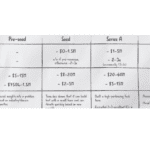
Balancing growth and efficiency is more important than ever. The median valuation and round size of a seed or Series A round hasn’t changed much compared to 2021. However a subset of the data is indicating that most companies are somewhat further ahead when they raise their seed or Series A (ARR of $2.5–3m+, compared to previous years expectations of $1–2m).
Good governance
OnBoard released the inaugural State of Startup Governance in NZ, finding that: startup boards have different needs to established ones, the quality and effectiveness of startup boards varies massively, and most founders have not been deliberate or empowered to get the most out of their boards. Packed with loads of practical tips, this is a must-read for founders and directors.
What are the traits of great boards?
- Willingness to put in the time and energy, and are engaged outside of board time.
- Able to bring out the best out of the CEO and management team, by not only being a guide and a support but also challenging them when appropriate.
- Diverse skills and expertise, suitable for what the business needs at the time.
- Focused on the key issues and strategy, rather than just compliance, risk and box ticking.
- The board includes independent directors and an experienced chair.
If you’d like to chat about how to improve your board or leadership team’s effectiveness, book in for our free Office Hours.
Movement on the ASX
No deal. The board of ASX-listed share brokerage group SelfWealth rejected a $41.2m takeover offer (a premium of 25% of the previous day’s close price) from its competitor Stake on Friday.
No growth. Redbubble was underlying cash flow positive last quarter. However the company is prioritising cost-cutting over sales growth – marketplace revenue dropped 6% from the previous corresponding quarter.
IPO Biggie. Data centre giant AirTrunk is preparing for a $10bn+ listing. If successful, this will be the biggest IPO since Medibank Private’s $5.7bn listing in 2014. Current contracted EBITDA is around $600m.
AirTrunk was founded in 2015 by [Robin] Khuda, who formerly worked as the chief financial officer for Bevan Slattery and Steve Baxter’s PIPE Networks and then managed NextDC’s float in 2010.
It cut the ribbon on its first hyperscale data centres in western Sydney and Melbourne in 2017, and has since grown to be one of the largest data centre players in tier one markets in Asia-Pacific… AirTrunk is planning to build a $1 billion-plus hyperscale data centre in Tokyo dubbed TOK2.
Big Tech
Fact check. Mis- and disinformation about conflict between Hamas and Israel has been rampant on social media this week. The European Commission announced an investigation into X on Thursday over allegations that it spread disinformation. The EC has also sent letters to TikTok and Meta to remind them of their obligation to protect children and teenagers from violent content and terrorist propaganda, and to adopt misinformation mitigation measures.
Anti-competitive? Who, me? The U.S. Justice Department’s antitrust lawsuit against Google is underway. Google is defending claims it used monopoly power in internet search to limit competition, stifle innovation and violate users’ privacy.
Documents used during the trial have been also released, and one email chain in particular has got the internet talking. In it, the Google Ads team puts significant pressure on the Chrome team to roll back a feature that was great for users, but led to reduced search. That meant less revenue for the Ads team, missed sales quotas, missed quarterly earnings, and, the Ads team threatened, lower compensation for everyone at Google.
Meanwhile, Google has been paying Apple billions to be its default search engine. Wild numbers:
Google has paid Apple an estimated $120B since 2010 to be the default search engine on Safari/iOS, with $19.3B estimated this year alone (Source: GS)
— Matthew Ball (@ballmatthew) September 22, 2023
In 2022, Google's payment was equal to a third of its net income and increased Apple's by 25%
(From: https://t.co/QXsjNrrbpn) pic.twitter.com/SM8hPemyLw
So… if Google is a mega monopoly, what does that make Apple?
This comes as Australian founder Matt Berriman battles in Court to prove that Google acted in an anti-competitive manner when it banned Unlockd’s app from its platforms, leading to its collapse.
The State of AI Report 2023 is out. 2023 was of course the year of the LLM, which continues to drive real-world breakthroughs, including meaningful steps forward in both molecular biology, drug discovery and health. One example in Australia is Annalise.ai, which scans chest X-rays and brain scans.
The expert AI predictions this year:

rich.ai. The British territory of Anguilla now estimates it will generate as much as US$30m in domain-registration fees for 2023. With a population of less than 20,000, that figure represents 10% of the territory’s GDP.
That’s a wrap! We hope you enjoyed it.
Bex, Gavin and the team at Ignition Lane
–
Gavin and Bex make it their business to know everything going on in technology, startups and venture capital.
Gavin is the Founder and CEO of Ignition Lane. He has 25 years of experience in the technology industry across startups, corporates and venture capital. Gavin was a founding Partner at venture capital firm Square Peg, an SVP of Product and Technology at Experian, and was one of the first employees and CTO at Hitwise – a venture-backed startup that was acquired for US$240m in 2007.
Bex is a founding Partner at Ignition Lane. Driven by curiosity, her career is the epitome of unconventional – spanning technology commercialisation and operations, corporate law, IT delivery and more. Applying this unique mix of skills and experience, she now works with CEOs and their teams to solve problems, drive growth and move beyond the status quo.



Related posts

Visionary Behind the Bionic Ear Honoured in 2024 Pause Awards Hall of Fame
3 December, 2024

Australia’s boldest innovators announced and new chapter for 2025
3 December, 2024

Top five winners score the most invaluable encounter
19 November, 2024

How Ally Watson is pioneering tech careers for women
15 November, 2024

Breakthrough Insights, Strategies, Creativity and Culture for now
12 November, 2024

Life lessons on ownership and how to keep creative control
6 November, 2024

How to unlock the intangible in brand equity with 4P’s
29 October, 2024

Discover trailblazing Finalists of Pause Awards 2024 in Australia
28 October, 2024

Why Bunnings feels like home: trust, community and genuine care
23 October, 2024

Why creativity and imagination will save the world
22 October, 2024

How Canva transformed a simple idea to become global leader
15 October, 2024

How NASA’s new AR tech will take astronauts to the next frontier
11 October, 2024

How to build authentic workplace culture
7 October, 2024

How to balance business growth with personal wealth
24 September, 2024

A time to dream big with Kristina Karlsson
16 September, 2024

The purpose of gatekeepers in authentic brand storytelling
6 September, 2024

It’s here, a final call to enter the Pause Awards this year
3 September, 2024

Join a free 7-week online learning on the go
3 September, 2024

Pause Awards partners with Ticker for exclusive broadcast coverage
6 August, 2024

Calling Melbourne — a significant player to enter!
6 August, 2024

Calling Hobart — an emerging hub to enter!
26 July, 2024

Calling Canberra — with most daring new ideas to enter!
16 July, 2024

Meet final judges and why they love Pause Awards
15 July, 2024

Meet even more judges and why they love Pause Awards
8 July, 2024

Meet more judges and why they love Pause Awards
5 July, 2024

Calling Adelaide — dynamic centre for innovation to enter
4 July, 2024

Meet the judges and why they love Pause Awards
1 July, 2024

Maybe those shouldn’t have been there in the first place
27 June, 2024

Calling Perth — an emerging innovator to enter!
25 June, 2024

Read a thrilling mid year predictions by the judges
24 June, 2024

Jasmine Batra’s Breakthrough Moment
24 June, 2024

WithYouWithMe’s Breakthrough Moment
24 June, 2024

Paz Pisarski’s Breakthrough Moment
20 June, 2024

UpStock’s Breakthrough Moment
20 June, 2024

Calling Brisbane — a rising star to enter!
19 June, 2024

How to choose the right category for the Pause Awards?
17 June, 2024

Success stories of past Pause winners
17 June, 2024

Your guide to the Pause Awards entry process
17 June, 2024

Understanding the breakthrough question
17 June, 2024

Top 10 tips on how to enter Pause Awards
17 June, 2024

Calling Sydney — a powerhouse of opportunity to enter!
6 June, 2024

Inke’s Breakthrough Moment
6 June, 2024

ReSource’s Breakthrough Moment
3 June, 2024

Brittany Garbutt’s exchange with Paul Bassat on building and sustaining a business empire
21 May, 2024

Entering Pause Awards for the first time?
21 May, 2024

Inside the Pause Awards 2024: A universe of possibility
14 May, 2024

What’s a Pause Awards breakthrough?
14 May, 2024

Marcella Romero’s Breakthrough Moment
9 May, 2024

Music Health’s Breakthrough Moment
2 May, 2024

Chau Le’s Breakthrough Moment
30 April, 2024

Tanck’s Breakthrough Moment
26 April, 2024

Macro Mike’s Breakthrough Moment
23 April, 2024

Birchal’s Breakthrough Moment
18 April, 2024

Tixel’s Breakthrough Moment
16 April, 2024

Redefining success with Angus and Neil of Tanck
15 April, 2024
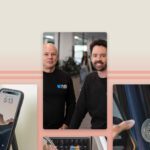
Quad Lock’s Breakthrough Moment
12 April, 2024

Origin Energy’s Breakthrough Moment
10 April, 2024

Mel Stubbing’s breakthrough moment
5 April, 2024

Brittany Garbutt’s breakthrough moment
2 April, 2024

InvestorHub’s Breakthrough Moment
28 March, 2024

Kollektive’s Breakthrough Moment
26 March, 2024

Talking robots and AI Agents, two insane demos
25 March, 2024

Fight Club and Zombie VCs
25 March, 2024

WeMoney’s breakthrough moment
20 March, 2024

Addressing gender inequality with 21.7% discount for female-led companies
8 March, 2024

How Entertainment Brands are winning hearts and minds
5 March, 2024

2023 packed a punch
17 January, 2024

The power of relationships with Dom Pym at Pause Awards Night
19 December, 2023

Six years of celebrating the Australian most ambitious innovators
5 December, 2023

Announcing the 63 ambitious finalists, 3 winners and Pause Awards Night
30 October, 2023

Can optimism and curiosity win the battle with Ai
20 October, 2023

Looking at 100 years from now in Solar, EVs and MedTech
20 October, 2023

What does the Australia’s VC landscape look like in 2050
19 October, 2023

Do we want to live in a Black Mirror world?
17 October, 2023

Four new emerging directors envision sustainable future beyond 2050
6 October, 2023

Visible Founders puts a spotlight on migrant entrepreneurs
28 September, 2023

Always be closing & IPO, no?
24 September, 2023

Strong commitment needed to run tech events in Australia revealed at GEC23
24 September, 2023

iPhone 15 event: everything about Apple’s new product line
14 September, 2023

Discover the colourful world of oral hygiene with Dsmile’s new range
13 September, 2023

How to build a company culture in dynamic market
8 September, 2023

The valuable startup lessons hidden in the film Oppenheimer
7 September, 2023

Meet the new addition to the Judging Board ‘23
4 September, 2023

Advice on Design Thinking for stellar product development
1 September, 2023

How Pause Awards can put your brand on the map
30 August, 2023

Seize the moment: New Extended Entry Deadline
30 August, 2023

I got 99 problems
26 August, 2023

Is AI the new frontier of creativity and business
25 August, 2023

Tech legends unite to guide growth and foster innovation
22 August, 2023

The new faces of Pause Awards in business and the product officers
21 August, 2023

Don’t miss out on the last chance to join champions
21 August, 2023

Experience is a new frontier for brands
18 August, 2023

How to grow an idea into a great product
11 August, 2023

Good storytelling and trust will fuel startup and brand growth
4 August, 2023

Twitter to X: a rebrand to challenge tech giants and empower users
4 August, 2023

Discover the latest tech predictions of 2023
1 August, 2023

Elevate your business with Stephen Hunt’s success secrets
31 July, 2023

Lean into digital marketing trends now and in 2024
28 July, 2023

The new faces of Pause Awards from agency and media innovation
25 July, 2023

Hit it, DJ! and other local newsings
24 July, 2023

Female-led ethical fintech Verve raises $3M for Verve Money
21 July, 2023

How to better tune into your success journey
21 July, 2023

Pause Fest’s BREAK–THROUGH SESSIONS will keep you scaling
12 July, 2023

How to choose the right awards for your business
5 July, 2023

The new faces of Pause Awards in strategy and leadership
4 July, 2023

We’re building the community for the most ambitious people
27 June, 2023

It was worth waiting for these unique features
26 June, 2023

Mapping the future of fit and function
23 June, 2023
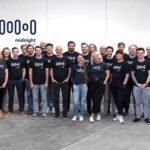
Midnight Health secures $24 million funding boost
21 June, 2023

Championing breakthroughs in today’s business world
21 June, 2023

OpenAI’s Sam Altman says hai
19 June, 2023

Top 5 compelling reasons why you should enter
18 June, 2023

Pause Awards vs Webby’s, Cannes Lions and Effies
18 June, 2023

The new faces of Pause Awards in startup, product and experience
15 June, 2023

A tour of 11 new categories
12 June, 2023

Inside out of Pause Awards
5 June, 2023

Aim for the Diamond: Understanding the Different Categories
1 June, 2023

The new faces of Pause Awards in strategy, growth and innovation
30 May, 2023

Where business recognition gets a paradigm shift
24 May, 2023

Industry leaders predict a transformative year ahead
17 May, 2023

Pause Awards grows to $412 Billion ecosystem
17 May, 2023

Shaking it up with new Investable Score™
17 May, 2023

Tap into your inner powerhouse
5 May, 2023

Life in the fast (tech) lane
24 April, 2023

evee rides the electric wave
18 April, 2023

Big win for the female-led business Circle In, lands $2 Million
14 April, 2023

Designing global empires:
How local brands can conquer the world
10 April, 2023

A passionate pursuit for Healthcare reinvention
4 April, 2023

The game-changing sessions at SXSW Sydney
30 March, 2023

Top AI tools you need to try now
29 March, 2023

A journey to revolutionising healthy school lunches
28 March, 2023

Panic! at the SVB & metrics that matter
16 March, 2023

Call for Entries
opens on 17 May ‘23
1 March, 2023

Startup funding in decline, but early-stage hits peak in Aus
10 February, 2023

Music for wellbeing:
The healing power of sound
20 January, 2023

Deep dive with ChatGPT about Aussie tech ecosystem
17 January, 2023

How it started; How it’s going 2022
17 December, 2022

Learning from mistakes and how to tackle the upcoming headwind
14 December, 2022

Claiming your PauseNFT trophy
13 December, 2022

Women and purpose led businesses take the most wins at Pause Awards ‘22
6 December, 2022

Professor Fiona Wood – The pioneer of ‘Spray-on-Skin’ technique, ReCell.
6 December, 2022

Rise and Demise
28 November, 2022

Let’s have breakfast with champions?
15 November, 2022

82 Bold Finalists Announced for the Pause Awards ‘22
10 November, 2022

Judge Sessions with Lumigo, Tribal DDB and Clipboard Hospitality
24 October, 2022

Judge Sessions with LongView, Fullstack and Art Processors
20 October, 2022

The first look at the new wearable trophy design
13 October, 2022

The Public Voting is open, go get them!
10 October, 2022

Cash to splash & other VC news
2 October, 2022

The Final Deadline Extended to midnight 14 October
30 September, 2022

Judge Sessions with Wavia, SEIKK and MedTech Actuator
26 September, 2022

Pause Awards Wins Australia’s International Good Design Awards for Design Excellence
19 September, 2022

Judge Sessions with Synergy Group, AOK Creative and i4 Connect
16 September, 2022

A word with Birchal’s Co-Founder – Matt Vitale
6 September, 2022

What can Pause Awards bring to your company
30 August, 2022

Google, Synergy Group, Spaces Interactive, Safari and By Jacs judges for Culture categories
24 August, 2022

Loyal VC, Media.Monks, AOK Creative, Storyfolk and Irene Lemon judges for Good categories
15 August, 2022

Fullstack, Lumigo, Netambition, MedTech Actuator and Unhedged judges for Operators categories
10 August, 2022

A word with Heaps Normal’s Head of Brand – Peter Brennan
9 August, 2022

Tribal DDB, We Are Unity, Bullfrog, BeautifulAgile and The Audacious Agency judges for your Excellence
2 August, 2022

Simply Wall Street, IBM, Forestlyn, CFOWorx and Accenture Song are this year Growth Judges
1 August, 2022

Venture snapshot: down but not out
26 July, 2022

Best equity crowdfunding year in Australia – $86m!
22 July, 2022

How to navigate the awards Entry Portal?
14 July, 2022

Startup Genome ecosystem report 2022 review
10 July, 2022

We’re giving a voice to our community with a stylish newsroom design
10 July, 2022

Professor Martin Green
– The father of solar cells
10 July, 2022

Dr John O’Sullivan
– The inventor of modern WiFi
10 July, 2022

14 New award categories under five tracks to highlight the ecosystem success
5 July, 2022

M&A on the rise & the EV SPAC demise
29 June, 2022

Our new vision:
The home for champions
27 June, 2022

Awards LIVE Briefing and Entry Kit
22 June, 2022

The Porsche of awards programmes with community at its heart
21 June, 2022

The Sheet Society
– Success Stories
17 June, 2022

We’re looking for our final few judges – could you be one?
8 June, 2022

Single Use Ain’t Sexy
– Success Stories
1 June, 2022

Afterpay
– Success Stories
24 May, 2022

This is how we celebrate innovation champions
15 December, 2021

The most ambitious and forward-thinking companies in Australia revealed
24 November, 2021
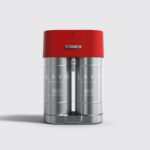
Pause Awards 2021 Finalists Skyrocket
17 November, 2021

Final Deadline is Looming
1 September, 2021

Get to know:
Carolyn Breeze – Judge
24 August, 2021

Get to know:
Will Hayward – Judge
17 August, 2021

Get to know:
Shamila Gopalan – Judge
10 August, 2021

Get to know:
Tom Leyden – Judge
3 August, 2021

Get to know:
Jules Brooke – Judge
26 July, 2021

Get to know:
Jamie Finnegan – Judge
18 July, 2021

Early Entries end This Week
12 July, 2021

Need Help Entering Pause Awards?
6 July, 2021

2021 Award Category Guide
1 July, 2021

How to Enter The Pause Awards in 7 min?
25 June, 2021

Get to know:
Melanie Rayment – Judge
24 June, 2021

Past winners:
where are they now?
24 June, 2021

Pause Awards 2021 opens for entries
9 June, 2021

New categories revealed for Pause Awards 2021
5 June, 2021

Meet the Judging Board 2021
13 May, 2021

The Reign in the North
1 February, 2021

What went into creating Vincent, a hyper-real digital human
21 January, 2020

Dane O’Shanassy on Patagonia’s moral compass and commercial success
6 November, 2019
Pause index

WeVolt
Culture Champion
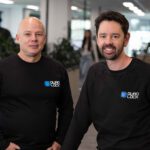
Quad Lock
Work Sweet Work, Movement, Design First, Out Of The Garage, Hammer

AECO Energy
Going Green

Alex Goulios
Future Builder

myDRIVESCHOOL
I Wish I'd Done That

Hub Australia
Hottest Hub

Single Use Ain’t Sexy
I Wish I'd Done That

Upstock
Design First, Down Under

Ovira
Out Of The Garage, I Wish I'd Done That, Hammer

Bill Fairies
I Wish I'd Done That

Angela Harbinson
Women In Business


